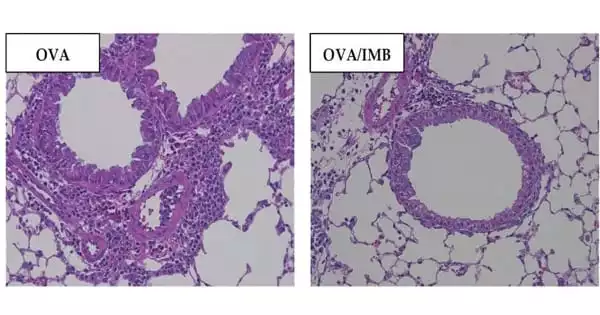It’s no secret that health and wellness have been a major global trend in the food and restaurant industries for several decades. As a result, there has been a significant increase in the number of fermented foods available on the market, as well as a rising discussion over their health advantages. Fermented foods are thought to have health benefits for the gut, brain, immune system, skin, and even weight loss.
In an animal model, researchers discovered that ImmuBalance, a fermented soybean product, is beneficial in lowering airway inflammation induced by asthma. The presence of eosinophils in bronchoalveolar lavage fluid was reduced, mucus formation in the bronchial epithelium was reduced, and substances that cause eosinophilic inflammation were suppressed.
Bronchial asthma is a chronic disease that causes airway inflammation, reversible airway obstruction, and hyperresponsiveness. Eosinophils are thought to play essential roles in the etiology of asthma by secreting inflammatory mediators.
Bronchial asthma is characterized by symptoms such as wheezing and coughing as a result of persistent airway inflammation, but there is no effective treatment, allowing room for new preventative and treatment strategies. A recent study finds that ImmuBalance, a fermented soy product, reduces airway inflammation in animal models of asthma.
Steroid inhalants are the foundation of asthma treatments in clinical practice, but they are known to have significant side effects. Our findings imply that consumption of fermented soybean products could be advised as a supplemental asthma coping technique with fewer adverse effects.
Professor Tomoya Kawaguchi
Researchers from Osaka City University Graduate School of Medicine discovered that in an ImmuBalance-treated group of asthma model mice, white blood cells associated with asthma known as eosinophils were drastically reduced in the bronchoalveolar lavage fluid (BALF). In addition to a reduction in inflammation and mucus around the bronchi, the researchers discovered a suppression of proteins that generate eosinophilic inflammation.
“The association between soy intake and allergic disorders has been epidemiologically recorded in the past,” said Hideaki Kadotani, the study’s first author, “suggesting that the components of soy may have some anti-allergic properties.”
“It has been shown that gut microbiota imbalances may be involved in immune system and allergic illnesses, and fermented dietary fiber, such as that present in soy, may have positive effects in allergic asthma models.” Associate Professor Kazuhisa Asai, a research co-author, continues.

The effects of such an imbalance on asthma were investigated in the study by feeding ImmuBalance-enriched diet to asthma model mice. The amount of eosinophils in BALF was dramatically reduced in the ImmuBalance-treated group, as did inflammation around the bronchi and mucus production in the bronchial epithelium. The expression of Th2 cytokines and immunoglobulin serum IgE, both of which produce eosinophilic inflammation in BALF, was also examined and shown to be dramatically decreased when compared to mice fed a regular diet.
Allergic asthma is a diverse illness of the conducting airways characterized by chronic airway inflammation, decreased airway function, and tissue remodeling. Asthma prevalence has risen significantly over the previous few decades to epidemic proportions, with an estimated 300 million sufferers worldwide, a figure that is anticipated to expand dramatically over the next 15–20 years. Asthma is connected with massive healthcare expenses, and despite breakthroughs in effective therapy, the economic burden associated with disease control and morbidity continues to rise.
“Steroid inhalants are the foundation of asthma treatments in clinical practice, but they are known to have significant side effects,” says Professor Tomoya Kawaguchi, the study’s lead advisor. “Our findings imply that consumption of fermented soybean products could be advised as a supplemental asthma coping technique with fewer adverse effects.”
In children, asthma is a prevalent chronic respiratory condition. Its key pathogenic characteristics include airway inflammation and remodeling. Asthma-induced airway remodeling is aided by eosinophils, neutrophils, and other inflammatory cells. Asthma, being a chronic inflammatory condition, can lead to permanent airway remodeling if not treated properly. Asthma pathogenesis involves various factors, including genetic mechanisms, the immunological response, chronic airway inflammation, airway hyperresponsiveness, airway neuromodulation abnormalities, and neuronal signaling pathways, according to research. The primary pathogenic factor is the immunological response.














